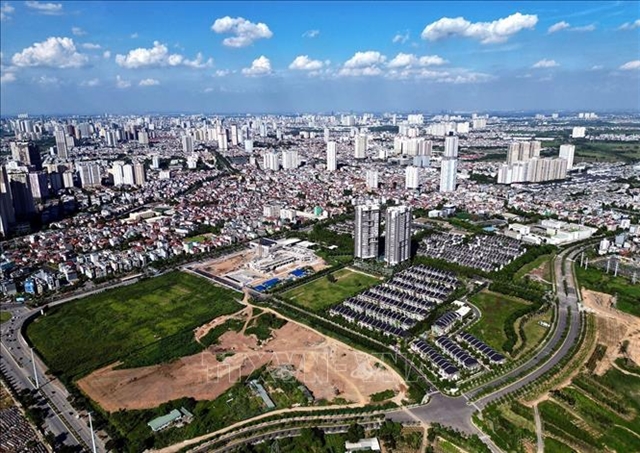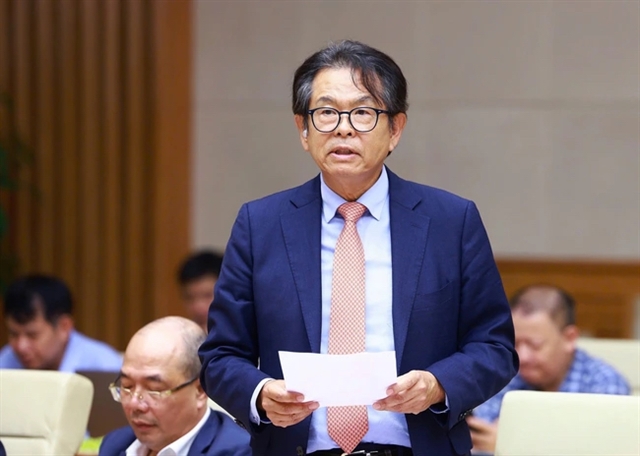 Economy
Economy


|
| Kim Byoungho, chairman of the Board of Directors of HDBank, speaks at a meeting on Saturday in Hà Nội. — Photo courtersy of HDBank |
HCM CITY — The Ho Chi Minh City Development Joint Stock Commercial Bank (HDBank) will continue to support individuals and enterprises affected by the recent storm, said its chairman of the Board of Directors.
Speaking at a meeting on Saturday in Hà Nội, Kim Byoungho said the private lender would offer a preferential credit package totaling VNĐ10 trillion (US$406.5 million) to assist those affected by the adverse weather conditions.
The package would feature interest rate reductions of 1-2 per cent compared to standard rates, he said.
HDBank would also implement a 1 per cent reduction in interest rates for existing loans that support customers’ production and business activities.
For new production and business loans, interest rates would be reduced by 2 per cent for the first three months relative to current rates, or would be set at zero per cent for the first month.
It also plans to disburse credit worth VNĐ7 trillion for the forestry, fisheries, and social housing sectors in the near future, according to the chairman.
By 2030, the bank aims to disburse VNĐ100 trillion for social housing projects, to construct 200,000 new social housing units.
The bank's employees, its subsidiaries, and affiliated companies have contributed one day’s salary, worth up to VNĐ30 billion, to aid individuals impacted by the recent storms and floods.
Typhoon Yagi, Việt Nam’s strongest storm in 30 years, struck on September 7, resulting in 292 deaths and nearly 40 missing by September 15, according to a report by Vietnamese authorities.
It damaged nearly 232,000 homes, flooded over 190,000 hectares of rice, and destroyed 32,000 hectares of fruit trees.
The storm wiped out 3,269 aquaculture cages and led to the loss of over 2.6 million livestock, with total damages estimated at VNĐ50 trillion ($2 billion).
Recommendations
Byoungho from HDBank recommended the State Bank of Vietnam (SBV) allocate additional credit targets to financial institutions with strong capital supply capabilities.
He proposed consumer credit programmes to support workers in industrial parks, similar to the VNĐ20 trillion package from 2023.
He also suggested increasing credit for social housing, rural agriculture, and community recovery post-storms.
HDBank also called for measures to address legal and administrative challenges hindering business expansion, as many enterprises face procedural rather than capital issues.
Given the high non-performing loan ratio, he recommended extending the classification of debt groups until after December 31, 2024.
A recent SBV directive indicated that commercial banks that have achieved 80 per cent of the credit growth targets established by the SBV at the beginning of the year will be eligible for an increase in their credit limits.
“Credit growth must be carefully planned to minimise the non-performing loans and safeguard the financial system,” says the SBV directive.
“Available credit should prioritise production industries, key growth sectors, and economically strategic areas.”
HDBank’s credit growth has exceeded 15 per cent since the beginning of the year, with total outstanding loans surpassing VNĐ390 trillion.
Its individual non-performing loan ratio remains low at a mere 1.74 per cent, according to Byoungho.
As of the end of August, market credit growth in Việt Nam has increased by 6.63 per cent compared to the end of 2023.
The government has set a target of 15 per cent, which implies that an additional 8.37 per cent, equivalent to over VNĐ1.135 quadrillion, can be added by the year’s end. — VNS





 Brandinfo
Brandinfo